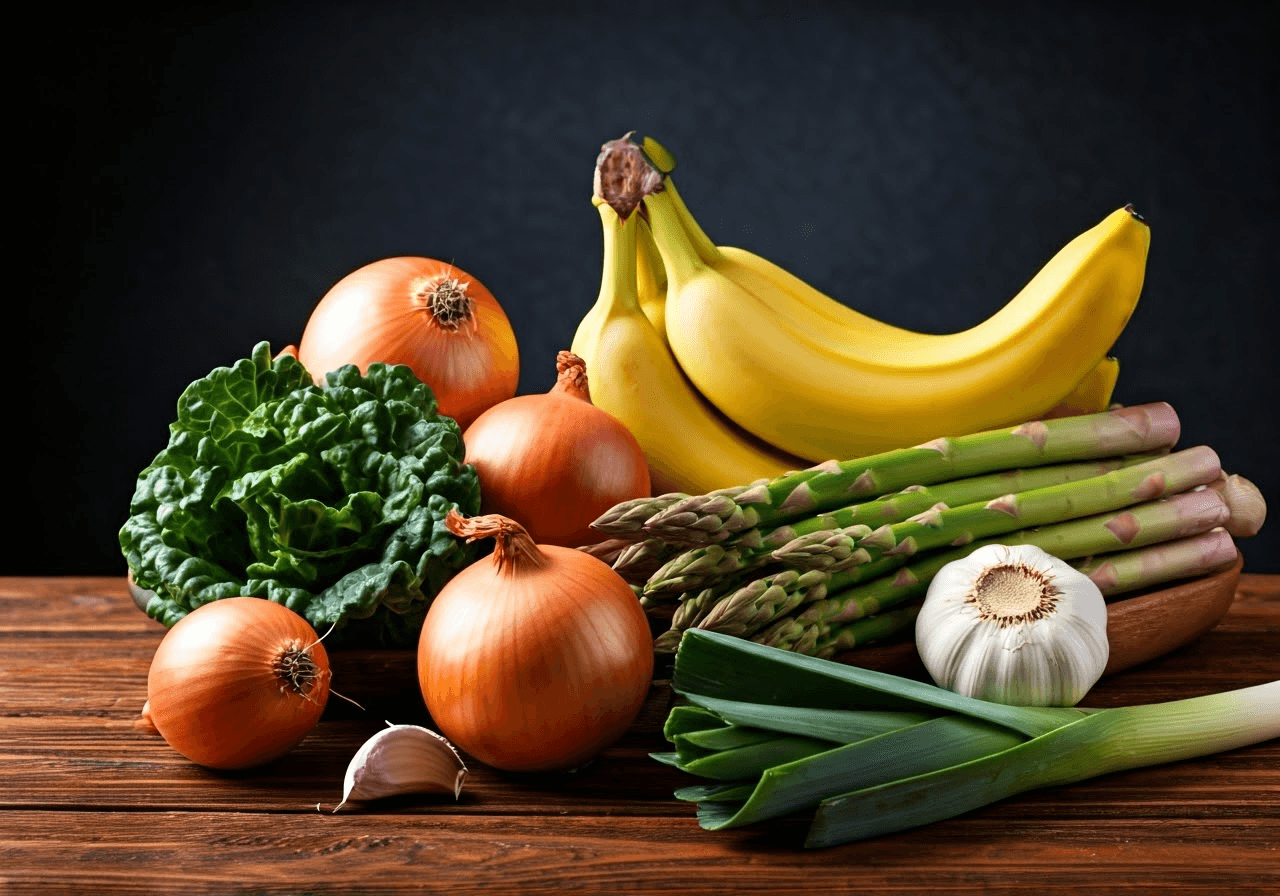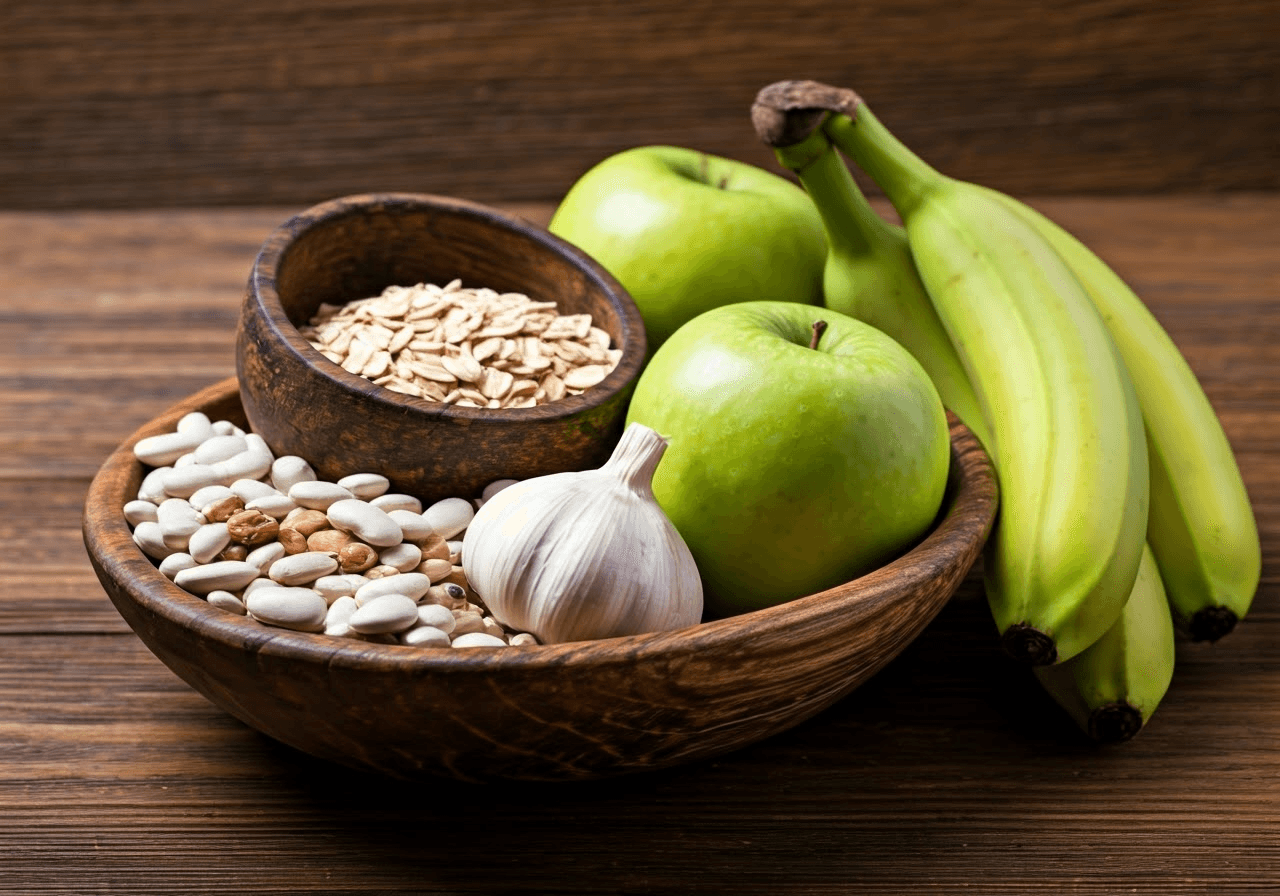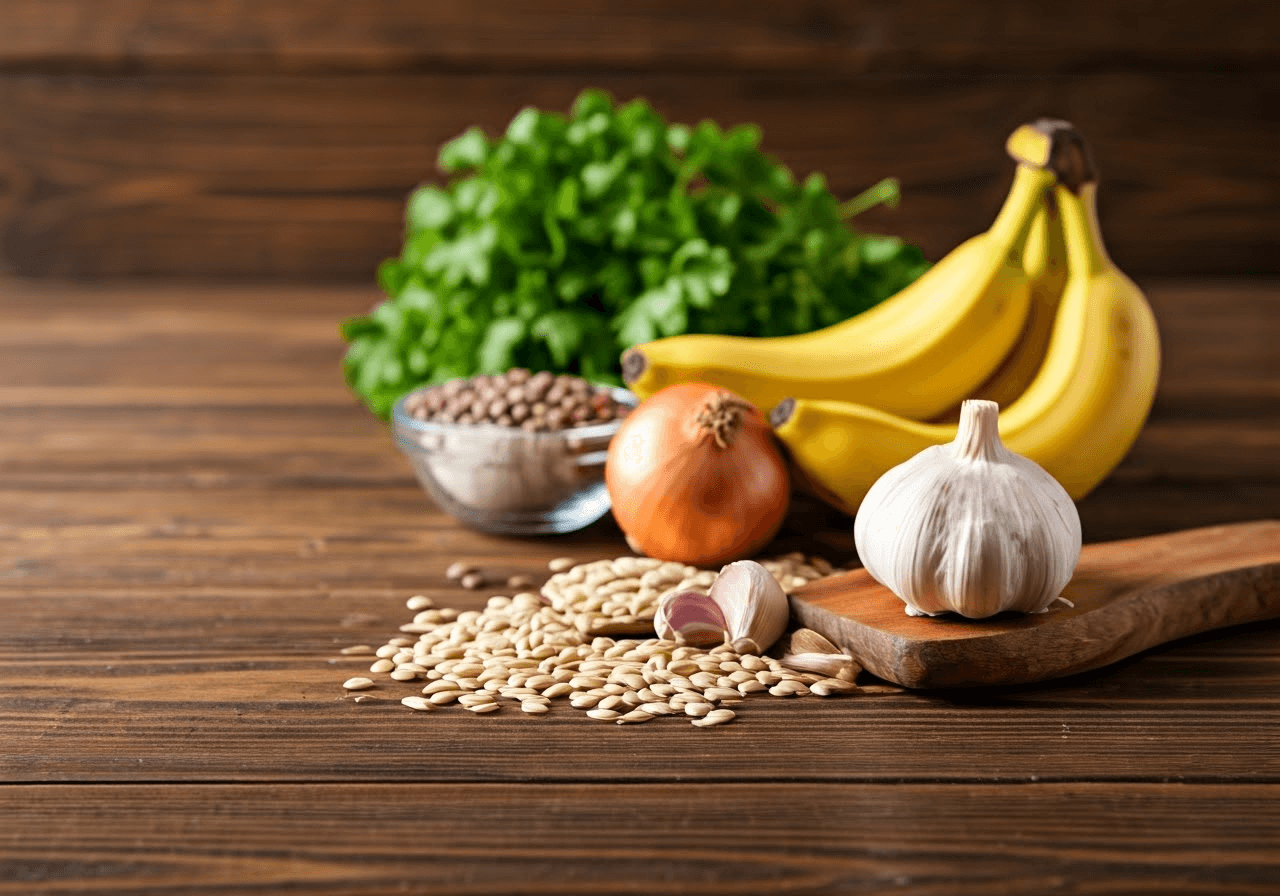
Want to help your gut feel good, support your immune system, and have better digestion in a simple way? Prebiotics are important for this, but many people do not know how useful they can be. These special fibers are in some foods and act like food for the “good bacteria” living in your gut. They help keep your digestion on track and help your body feel good. In this guide, you will find out all about prebiotics. You will read about why they are good for your health, what foods have the most prebiotics, how they are not the same as probiotics, and easy ways to add them each day.
What Are Prebiotics? Comprehensive Overview
Prebiotics are a unique type of dietary fiber with special properties. Unlike most carbohydrates, they are not easily digested in the upper gastrointestinal tract. Instead, they pass through to the colon intact, where they serve as food for beneficial gut bacteria.
By nourishing these bacteria, prebiotics support a healthy gut microbiome, which is essential for overall well-being.
Why Are Prebiotics Important for Gut Health?
Prebiotics are plant-based fibers, such as wheat bran, that act as fertilizer for beneficial gut bacteria. Since the body cannot digest these fibers, they travel through the digestive system unchanged until they reach the large intestine. There, they become a vital food source for good bacteria, helping them grow and function more effectively.
A balanced gut microbiome is crucial for human health. It strengthens the immune system, improves nutrient absorption, promotes regular bowel movements, and protects against harmful pathogens. By fueling beneficial bacteria, prebiotics help maintain this balance, supporting digestive health and overall immunity.
Prebiotics Discovery and Their Role in Modern Nutrition
The concept of prebiotics is relatively recent. The term was first introduced in 1995, but research into their benefits has expanded significantly in recent years. Early studies identified fibers like fructooligosaccharides (FOS) and inulin as having prebiotic effects, leading to their inclusion in functional foods that aid digestion.
As scientific evidence continues to grow, prebiotics are now widely incorporated into functional foods and dietary supplements. Health claims regarding their role in digestive health and immune function are also becoming more common.
With increasing recognition of their benefits, prebiotics are now considered an essential component of a healthy diet.
How Prebiotics Support Gut Microbiome & Digestive Health

The human gut is home to many bacteria, known as gut microbiota or gut flora, which contribute to our gastrointestinal microflora. These tiny organisms are very important for our health. They help not only our digestive system but also other functions in our body. Prebiotics are key supporters of this complex system.
Prebiotics feed the good bacteria in our gut. This support helps keep a healthy balance in the gut flora. When this balance is right, it is easier to digest food, absorb nutrients, and protect against diseases.
How Do Prebiotics Work in the Gut Microbiome?
Prebiotics are not digestible by human enzymes. They move through the digestive system until they reach the large intestine. In the large intestine, they meet many types of gut bacteria. Prebiotics are different from other carbs because they help good gut bacteria grow and work better. This includes bacteria like Bifidobacteria and Lactobacilli.
Prebiotics help this process by acting as food for fermentation, demonstrating a significant prebiotic effect. For example, resistant starch is a kind of prebiotic that gut bacteria ferment. This fermentation creates short-chain fatty acids (SCFAs) such as butyrate, acetate, and propionate.
These SCFAs have many health benefits. They give energy to colon cells, help keep the gut pH balanced, and strengthen the gut barrier. All these things help maintain a healthy gut microbiome.
Prebiotics Benefits for Digestive Wellness
Prebiotics are important for gut bacteria and digestive health. They help good bacteria grow, which leads to a balanced gut microbiome. This balance is crucial for good digestion and may also enhance the absorption of calcium.
For example, prebiotics may help improve symptoms of irritable bowel syndrome (IBS), a common issue with the large intestine. Some studies show that prebiotics can reduce IBS symptoms like bloating, gas, and abdominal pain. They do this by helping good bacteria grow and lowering the number of harmful ones.
Additionally, prebiotics support the overall health effects of the digestive system. They can help the body absorb nutrients better, encourage regular bowel movements, and may even lower the risk of some digestive problems.
Prebiotics vs Probiotics: Key Differences Explained
Both prebiotics and probiotics help keep your gut healthy, but they are quite different. Probiotics are live microorganisms, also known as “good bacteria.” You can find them in fermented foods like yogurt, kefir, and sauerkraut. When you eat enough probiotics, they increase the number of helpful bacteria in your gut.
Prebiotics, however, are not live organisms. They serve as “food” for the good bacteria in your gut. Prebiotic foods give these beneficial bacteria the nutrients they need to grow and thrive. So, when you eat prebiotics, it can boost the good bacteria that are already in your gut.
In short, probiotics introduce good bacteria to the gut, while prebiotics help the existing ones grow. Both are crucial for a healthy gut microbiome.
To better understand how they work together yet differ, here’s a quick side-by-side comparison of prebiotics and probiotics:
| Feature | Probiotics | Prebiotics |
|---|---|---|
| What They Are | Live microorganisms (bacteria & some yeasts) | Non-digestible food components (mostly dietary fibers) that feed beneficial gut bacteria |
| Nature | Living organisms | Non-living food ingredients |
| Primary Role | To add beneficial microbes to your gut | To feed and nourish the existing beneficial microbes in your gut |
| Mechanism of Action | – Directly colonize the gut (often transiently) – Compete with harmful pathogens – Produce beneficial substances (vitamins, antimicrobials) – Modulate the immune system | – Selectively stimulate growth/activity of beneficial bacteria (like Bifidobacteria, Lactobacilli) – Fermented by gut bacteria to produce short-chain fatty acids (SCFAs) such as butyrate, acetate, and propionate. These compounds support gut lining and immune health |
| Survival in GI Tract | Can be susceptible to stomach acid, bile, and heat. Viability can be a concern (not all strains survive transit to the colon) | Generally resistant to digestion in the upper GI tract (gastrointestinal tract); reach the colon largely intact |
| Stability | Sensitive to heat, light, and moisture. May have a shorter shelf life or require refrigeration | Generally stable during food processing, storage, and cooking |
| Examples/Types | – Lactobacillus (e.g., L. acidophilus, L. rhamnosus) – Bifidobacterium (e.g., B. bifidum, B. longum) – Saccharomyces boulardii (yeast) | – Inulin – Fructooligosaccharides (FOS: a type of plant fiber) – Galactooligosaccharides (GOS: plant sugars from beans, lentils, milk) – Resistant starch – Pectin – Beta-glucan |
| Common Food Sources | – Fermented foods: Yogurt (with live & active cultures), kefir, sauerkraut, kimchi, kombucha, tempeh, miso – Supplements: capsules, powders, liquids | – Fruits & vegetables: Chicory root, Jerusalem artichoke, garlic, onions, leeks, asparagus, green bananas, apples – Grains: oats, barley – Legumes: beans, lentils, chickpeas – Supplements: extracted inulin or FOS |
| Best Supplement Options | Probiotic capsules, tablets, spore-forming probiotics | Prebiotic fiber powders, inulin, FOS, GOS supplements (may be labeled as “fiber” or “prebiotic” on packaging) |
| Main Benefits | – Improve digestion- Support immune function – May help with antibiotic -associated diarrhea, IBS symptoms (Irritable Bowel Syndrome; effect depends on strain) – Restore gut flora balance | – Promote growth of beneficial gut bacteria – Improve gut barrier function – Enhance mineral absorption (like calcium) – Support immune function (via SCFA production) – May help with bowel regularity – May contribute to satiety |
| Who Should Use | Helpful for those with digestive issues, after antibiotics, or for immune support | Most people benefit, especially those wanting better digestion or gut health |
| Potential Side Effects | Gas, bloating, very rarely infections (in people with weakened immune systems); effects can be strain-specific | Gas, bloating (if too much too quickly or if you suddenly increase fiber intake), especially with high-fiber sources like chicory root or Jerusalem artichoke; introduce slowly |
| Analogy | Seeds for a garden: Planting new beneficial organisms | Fertilizer for a garden: Nourishing the existing beneficial organisms to help them thrive |
| Considerations | Strain-specific effects (not all probiotics are the same); quality and viability of supplements vary; may require refrigeration | Variety is best for diverse gut health; increase intake gradually to avoid digestive discomfort |
Prebiotics for Immune System: How Gut Health Impacts Immunity

New research highlights how our gut health is closely linked to our immune system. A large part of our immune system is actually in our gut. This area, called gut-associated lymphoid tissue (GALT), is very important for protecting our body from harmful germs.
To keep our immune function working well, a diverse gut microbiota is key. Prebiotics help create a healthy gut environment. This can boost our immune responses and improve our overall well-being.
How Prebiotics Strengthen Immune Responses
Prebiotics help change the gut bacteria and can strengthen the immune system. They feed the good bacteria in the gut, which helps create a healthy gut. This healthy environment supports how the immune system works.
When bacteria break down prebiotics, they create short-chain fatty acids (SCFAs). One important SCFA is butyrate, which has been shown in a randomized controlled trial to reduce inflammation and helps the immune system. Prebiotics also increase the creation of certain immune cells, like IgA antibodies. These antibodies are very important for fighting infections.
This positive effect on the immune system shows how important prebiotics are for our health and overall well-being.
Gut-Immune System Axis: The Role of Prebiotics
The gut and the immune system work together, and this is called the gut-immune system axis. When one is healthy, it helps the other. Prebiotics play an important role in keeping this system balanced.
Having a mix of good bacteria in the gut, which is shaped by prebiotics, is vital for immune function. The healthy bacteria in our gut talk to immune cells. They help teach and strengthen the immune system’s responses. By helping these good bacteria grow, prebiotics also boost the immune system’s ability to tell the difference between safe things and possible threats.
A balanced immune response, guided by a healthy gut microbiome, helps stop chronic inflammation and autoimmune diseases.
Prebiotics and Chronic Diseases: Health Impact

Chronic diseases are becoming more common. This includes heart disease, type 2 diabetes, and some cancers, including colorectal cancer. Research shows there might be a connection between gut health and these diseases. Prebiotics could help with prevention and management.
Prebiotics can support a healthy gut microbiome. The consumption of prebiotics may lead to better metabolic processes and immune responses. As a result, they could lower the risk factors linked to chronic diseases like inflammatory bowel disease (IBD) and cardiovascular disease.
Prebiotics for Reducing Inflammation
Chronic inflammation is known to be a major cause of many long-term diseases. Prebiotics can help reduce this inflammation because they affect the gut bacteria.
When gut bacteria break down prebiotics, they create short-chain fatty acids like butyrate. Butyrate is a strong anti-inflammatory substance. It helps lower inflammation not just in the gut lining but throughout the body. By boosting butyrate levels, prebiotics help keep the gut healthy and may lower the chance of getting diseases related to inflammation.
Additionally, prebiotics can support the immune system. They increase the number of special immune cells that control how the body responds to inflammation. This action helps maintain a balanced immune system and improves overall health.
Can Prebiotics Help Prevent and Manage Diabetes?
Emerging research hints that prebiotics might help prevent and manage diabetes, especially type 2 diabetes. Researchers are still studying how this works, but some studies show that prebiotics may affect blood sugar levels and enhance insulin sensitivity.
Prebiotics might help by encouraging the growth of certain gut bacteria in healthy human subjects that create short-chain fatty acids (SCFAs), like butyrate. Butyrate can help improve insulin sensitivity, boost glucose uptake in muscles, and lower inflammation. All these effects can lead to better blood sugar control.
Although more research is needed to fully understand how prebiotics impact diabetes over the long term, these findings point to the potential benefits of using prebiotics in a complete plan for managing blood sugar levels and possibly lowering the chance of getting type 2 diabetes.
Prebiotics for Heart and Cardiovascular Health
Taking care of your heart is important for many people. Some research shows a possible link between eating prebiotics and heart health. Experts are still figuring out exactly how it works, but studies indicate that prebiotics might help lower some risk factors for cardiovascular disease.
For example, prebiotics can lower blood pressure, which is a key risk factor for heart disease. Other studies suggest they might also reduce LDL (bad) cholesterol and increase HDL (good) cholesterol levels, making your heart even healthier.
These early findings show that prebiotics could play a role in boosting cardiovascular health. This adds to the great list of benefits these gut-friendly fibers already have.
Surprising Benefits of Prebiotics Beyond Digestion

Prebiotics are well-known for helping digestion, but they also affect more than just the gut. Recent studies show a fascinating link between the gut and the brain, which we call the gut-brain axis.
This connection shows that the types and activities of our gut microbiota can affect different parts of mental health. This includes mood, thinking, and even sleep. By changing the gut microbiome, prebiotics may help with these benefits. This can lead to better overall well-being in surprising ways.
Prebiotics and Mental Health: The Gut-Brain Axis
The gut-brain axis is a connection between the gut and the brain. Researchers are looking into how gut health can affect mental health. Prebiotics might help support mental well-being by changing the gut microbiome.
Studies show that some types of gut bacteria thrive with prebiotics. These bacteria can make neurotransmitters like serotonin and GABA. These chemicals are important for mood and can help reduce anxiety. Also, having a healthier gut microbiome, thanks to prebiotics, may lower inflammation. Lower inflammation can lead to better mood and thinking abilities.
Research is still going on, but these results suggest that prebiotics could help with mental health. They support the gut-brain axis, giving us a natural way to improve overall well-being.
Prebiotics for Weight Management: What You Need to Know
Maintaining a healthy weight is a goal for many people. Adding prebiotic-rich foods to your meals can help you with this goal. Prebiotics don’t cause weight loss directly, but they may support weight management in different ways.
Research shows that prebiotics can help certain gut bacteria grow. These bacteria help control appetite, make you feel full, and may affect how your body uses energy. Prebiotics can also improve insulin sensitivity. This means they can help keep blood sugar levels stable and reduce cravings, helping you manage your weight more effectively.
To make the most of prebiotics, it’s good to eat them with a balanced diet and exercise regularly. This way, you can take a complete approach to achieving and keeping a healthy body composition. Keep in mind that changing the human colonic microbiota with diet is complicated, and you may need a personalized plan.
Can Prebiotics Improve Sleep Quality?
A good night’s sleep is important for your overall health and well-being. Surprisingly, prebiotics might help improve sleep quality. More research is needed to understand how this works, but there is some evidence that links gut bacteria to sleep patterns.
Some studies say that prebiotics can promote a healthy gut microbiome, which may help with sleep quality. Certain gut bacteria create neurotransmitters like serotonin. This neurotransmitter helps control sleep-wake cycles. Also, the fermentation products from prebiotics, such as short-chain fatty acids, may calm the brain and support better sleep.
While studies are still happening, adding prebiotic-rich foods to your diet along with good sleep habits could help you sleep better and feel more refreshed.
Best Prebiotic Foods and Dietary Sources

Eating a variety of prebiotic foods is important for gaining their many health benefits. Luckily, there are many tasty and easy-to-find foods that are high in these gut-friendly types of fiber. It can be very easy to add these foods to your meals.
You can find prebiotics in whole grains like barley and oats, as well as in vegetables like onions, garlic, and Jerusalem artichoke. Trying out new recipes and discovering different ways to use these foods can make healthy eating fun and long-lasting.
Top Natural Food Sources of Prebiotics
Nature gives us many tasty foods that have lots of prebiotics. You can easily add these foods to your meals by just changing a few items on your shopping list. Here are some great sources of prebiotics:
Whole Grains: Choose whole-grain bread, barley, and oats. They offer a good amount of prebiotic fiber, which is important for a healthy gut microbiome.
Vegetables: Load up on onions, garlic, leeks, asparagus, and Jerusalem artichoke. They are all great sources of prebiotics.
Fruits: Even though fruits are not as high in prebiotics as vegetables, bananas and apples still have helpful prebiotic fiber.
Eating a mix of prebiotic-rich foods helps give your gut bacteria different types of prebiotic fibers, which makes your gut microbiome more varied and strong.
To help you make smart choices, we’ve listed some of the top natural sources of prebiotics below—along with how much they contain and what other benefits they offer.
| Food Source | Approx. Prebiotic Content (per 100g, mostly raw unless stated) | Other Notable Nutrients / Benefits | Key Benefits (Based on Research & Guidelines) |
|---|---|---|---|
| Chicory Root | Very High (~15-20g inulin) | Manganese, Vitamin B6 | Boosts beneficial gut bacteria, improves bowel regularity |
| Jerusalem Artichoke (Sunchoke) | Very High (~14-19g inulin) | Potassium, iron, thiamin | Enhances mineral absorption, may help blood sugar, gut flora |
| Dandelion Greens | High (~10-15g inulin) | Vitamins A, C, K, iron, calcium | Supports gut and liver health, diverse microbiome |
| Garlic | High (~9-16g total prebiotics) | Allicin, manganese, Vitamin B6, Vitamin C | Immune support, supports gut flora, antimicrobial |
| Onions | Moderate-High (~2-6g prebiotics; higher in some types) | Quercetin, Vitamin C, chromium | Antioxidant, digestive health, supports gut microbiome |
| Leeks | Moderate-High (~3-12g inulin, mostly in white part) | Vitamin K, Vitamin A, manganese | Supports gut health and immunity, milder flavor |
| Asparagus | Moderate (~2-3g inulin) | Folate, Vitamin K, Vitamin A, Vitamin C, Vitamin E | Gut barrier support, antioxidant, heart health |
| Green Bananas (Unripe) | Moderate-High (Resistant starch is 70–80% of carbs when very green; drops as they ripen) | Potassium, Vitamin B6 | Promotes fullness, feeds gut flora, supports metabolic health |
| Oats (Rolled/Steel-cut) | Moderate (~3-5g beta-glucan; RS forms on cooling) | Soluble fiber, manganese, phosphorus, magnesium | Lowers cholesterol, improves gut flora, stabilizes blood sugar |
| Barley | Moderate (~3-8g beta-glucan; RS forms on cooling) | Selenium, manganese, fiber | Heart health, digestive regularity, long-lasting energy |
| Apples (with skin) | Moderate (~0.5-1.5g pectin, varies) | Vitamin C, antioxidants, fiber | Gentle prebiotic, antioxidant, aids regular digestion |
| Legumes (Beans, Lentils, Chickpeas) | Moderate-High (Varies; resistant starch increases with cooking/cooling) | Protein, fiber, iron, folate | Promotes gut flora, supports satiety, plant-based protein |
| Flaxseeds | Moderate (High fiber; a portion is prebiotic) | Omega-3 (ALA), lignans, fiber | Reduces inflammation, supports gut and heart health |
| Jicama | Moderate-High (~5-10g inulin/FOS combined, varies) | Vitamin C, low calorie | Hydrating, supports digestion, rich in prebiotic fiber |
| Seaweed (various types) | Varies by type | Iodine, minerals, unique antioxidants | Unique gut-supporting polysaccharides, provides trace minerals |
Prebiotic Supplements vs. Foods: Which Is Best?
Getting prebiotics from whole foods is best. However, adding prebiotic foods through supplements can be a good option, especially if you find it hard to get enough fiber each day. Here are some ways to add to your diet:
Prebiotic Supplements: You can find these in powders, capsules, or chewable tablets. They give you a strong dose of certain prebiotic fibers.
Prebiotic-Fortified Food Products: Many products like yogurt, granola bars, and cereals now include prebiotics. This makes it easier to boost your intake.
Keep in mind that prebiotic supplements might not offer the same health benefits as whole foods.
Focus on Variety: Look for supplements with a mix of different prebiotic fibers. This helps your gut microbiome stay diverse.
Start Slowly: Try starting with a low dose and slowly increase it. This way, you can see how your body handles it and reduce any side effects.
Consult with Your Doctor: Always talk to your healthcare provider before adding new supplements, especially if you have health concerns.
To help you decide which option fits your needs best, here’s a quick comparison of prebiotic-rich foods and supplements:
| Feature | Prebiotic Foods (Natural Sources) | Prebiotic Supplements |
|---|---|---|
| What They Are | Whole, minimally processed foods rich in prebiotic fibers (e.g., inulin, FOS, resistant starch, etc.) | Concentrated powders, capsules, tablets, or chewables containing isolated prebiotic fibers |
| Examples | Chicory root, garlic, onions, leeks, asparagus, oats, barley, apples, green bananas, legumes, flaxseeds, jicama | Inulin, FOS, GOS powders, prebiotic capsules, synbiotic blends, fiber gummies |
| Prebiotic Concentration | Lower and varies by food type and portion size | High and standardized; allows for precise dosing |
| Variety of Prebiotics | Broad spectrum of different prebiotic fibers within a single meal | Usually contains only one or a few types of prebiotic fibers |
| Digestive Benefits | Supports gut microbiome diversity, bowel regularity, and overall digestive health | Helps fill fiber gaps quickly; may target specific gut health needs |
| Digestive Tolerance | Usually well tolerated when introduced gradually | May cause bloating or gas—especially at high doses or with a sudden increase |
| Convenience | Requires grocery shopping, meal prep, and dietary variety | Very convenient, ready to use, no prep required |
| Dosing Control | Difficult to measure exact prebiotic intake from food | Easy to track dosage—clearly labeled on the packaging |
| Cost | Generally more affordable as part of a regular grocery budget | Can be more expensive per serving, especially premium products |
| Synergy of Components | Natural fibers and nutrients work together (“food matrix effect”) | Lacks the natural food matrix; reduced synergistic efficiency |
| For Specific Needs | Great for everyday gut health maintenance | Helpful for targeted use, higher doses, or under practitioner guidance |
| Long-Term Sustainability | Encourages healthy eating habits and a diverse, fiber-rich diet | Can help bridge gaps, but not a long-term replacement for whole foods |
Easy Ways to Add Prebiotics to Your Diet
Incorporating prebiotics into your daily diet is easy. Here are simple tips to help you add these healthy fibers to your meals:
Start Your Day with Oats: Enjoy a bowl of oatmeal each morning topped with berries and nuts. This makes a great prebiotic-rich breakfast.
Sneak in Veggies: Chop up onions, garlic, or leeks. Add them to soups, stews, sauces, and stir-fries to boost flavor and include prebiotics while enhancing your meals with a probiotic supplement.
Snack Smart: Choose prebiotic-rich snacks instead of processed ones. Try bananas, a handful of almonds, or roasted chickpeas.
Here are more tips to include prebiotics:
Choose whole-grain bread and pasta instead of refined ones.
Try different beans and lentils in your dishes.
Sprinkle flaxseeds or chia seeds on your yogurt or in smoothies.
Even small changes to your diet can improve your gut health. Try to eat a variety of prebiotic-rich foods during the day for the best health benefits. If you are a healthy individual considering dietary changes, it’s smart to talk to a healthcare provider or a dietitian for help and advice.
How to Start a Prebiotic-Rich Lifestyle

Including prebiotics in your daily life doesn’t need big changes. You can enjoy the long-term benefits of a diet full of prebiotic foods with simple steps and some knowledge about how to get the most out of them.
Start by slowly adding more prebiotic foods to your meals and notice how your body reacts. Keep in mind that having a healthy gut microbiome is a process, not a final goal. Regular effort is important to enjoy the health effects of dietary prebiotics and their great benefits.
First Steps to a Prebiotic-Rich Diet
Embarking on a diet rich in prebiotic foods can lead to a healthier gut and better overall health. Here are some easy steps to get you started:
1. Gradual Introduction: Rather than making sudden changes, slowly add prebiotic foods to your meals. This helps your gut get used to the new diet and reduces any digestive discomfort.
2. Choose Variety: Try to include a wide range of prebiotic foods. Different prebiotics support various helpful bacteria in your gut. The goal is to create a balanced and healthy gut microbiome.
3. Monitor and Adjust: Notice how your body reacts to the extra prebiotic foods. Some people might feel bit of bloating or gas at first, but this usually goes away as your gut adjusts. If necessary, change the type or amount of prebiotic foods you eat.
Keep in mind that changing your diet takes time. Patience and consistency are key to building a lasting prebiotic-rich eating habit that supports your health in the long run.
How to Monitor Your Body’s Response to Prebiotics
As you eat more prebiotics, pay attention to how your body feels. While prebiotics are safe for most people, some might notice mild stomach issues, like:
Gas
Bloating
Abdominal cramping
These side effects are often temporary. They usually go away as your body gets used to more fiber. But, if you have ongoing or serious digestive problems, it’s important to talk to your healthcare provider.
Also, keep an eye on any changes in your bowel movements because prebiotics can affect how quickly things move through your digestive system. Take note of your overall digestion, energy levels, and skin health. These can show how good your gut health is. Remember that everyone’s gut is different, and how you respond to prebiotics can change. It’s important to find out what works best for you and adapt your diet as needed.
To help track how prebiotics affect your body, use the table below to recognize both positive signs and possible side effects—so you can adjust your intake as needed.
| Aspect to Monitor | What to Look For | Signs of Positive Response | Signs of Sensitivity or Intolerance | What to Do / Adjustment Tips |
|---|---|---|---|---|
| Digestive Comfort | Gas, bloating, abdominal cramping | Mild, temporary increase (often normal as your body adapts) | Persistent or severe discomfort | Start with a low dose; increase gradually. Consult your doctor if symptoms persist. |
| Bowel Movements | Frequency, consistency | Regular, well-formed stools; slight changes as gut adapts | Ongoing diarrhea, constipation, urgency | Adjust amount or type of prebiotics; stay hydrated; seek medical advice if needed. |
| Overall Digestion | How your stomach and gut feel after eating | Comfortable, lighter feeling after meals | Ongoing discomfort, pain, feeling unwell | Reduce or pause intake; consult a professional if necessary. |
| Energy Levels | Daily energy or fatigue | Steady or improved energy | Unusual tiredness, sluggishness | Check diet balance and hydration; reduce dose if needed. |
| Skin Health | Breakouts, rashes, skin clarity | Clearer or unchanged skin | New or worsening skin issues | Track changes; consult your doctor if concerned. |
| Mood & Wellbeing | Mood, mental clarity, sleep quality | Stable mood, mental clarity, restful sleep | Increased irritability, anxiety, poor sleep | Review timing/type of prebiotic; adjust as needed. |
When to Consult a Doctor Before Taking Prebiotics
Before taking prebiotics, consult your doctor, especially if you have Irritable Bowel Syndrome (IBS), Inflammatory Bowel Disease (IBD), or Small Intestinal Bacterial Overgrowth (SIBO). These conditions affect gut health, and prebiotics can sometimes worsen symptoms like bloating, gas, or diarrhea.
For IBS, certain prebiotics may trigger discomfort by fermenting too quickly in the gut. IBD patients (Crohn’s disease, ulcerative colitis) should be cautious, as excessive fermentation can aggravate inflammation. SIBO sufferers may experience bacterial overgrowth worsening due to prebiotics feeding unwanted bacteria in the small intestine.
A healthcare provider can recommend the right type and dosage of prebiotics based on your condition. In some cases, low-FODMAP prebiotics or a gradual introduction can help minimize side effects. Always monitor your body’s response and adjust intake accordingly.
Common Myths and Facts About Prebiotics

The growing interest in prebiotics has caused many myths and misunderstandings. It is important to tell the difference between what is true and what is not. This will help you make smart choices about adding prebiotics to your meals.
Using scientific evidence and talking to healthcare experts can clear up these misconceptions. It is important to have a balanced view based on correct information. This way, you can truly benefit from prebiotics for better health and well-being.
Prebiotics: Fact vs Fiction
Many health trends come with myths and exaggerated health claims. When it comes to prebiotics, it’s important to check reliable scientific evidence. Always talk to healthcare professionals to know what is true and what is not.
A common myth is that all fibers act as prebiotics. This is false. Only certain types of dietary fiber, like inulin and FOS, have prebiotic properties. Another misconception is that prebiotics work right away. In truth, you need to take them regularly for several weeks to see their positive effects on the gut microbiome.
Be careful of claims that say prebiotics can cure certain diseases. While research shows they might help in preventing or managing some health issues, they shouldn’t replace traditional medical treatment. Use credible sources like scientific journals and trusted health organizations for the correct information. Speak with your doctor or a registered dietitian to get personalized advice.
To help you separate science from hype, here’s a quick guide to the most common myths and facts about prebiotics—so you can make informed choices for your health.
| Statement | Fact or Fiction | Evidence/Clarification |
|---|---|---|
| All dietary fiber is prebiotic | Fiction | Only certain fibers (like inulin, FOS, GOS, resistant starch) have proven prebiotic effects. |
| Prebiotics only benefit digestive health | Fiction | Prebiotics also support immune health, mineral absorption, and may affect mood and brain function via the gut-brain axis. |
| Prebiotics and probiotics are the same | Fiction | Prebiotics are fibers that feed good bacteria; probiotics are live beneficial bacteria. |
| Prebiotics can improve the gut microbiome | Fact | Supported by NIH, WHO, and major studies—prebiotics promote the growth of beneficial gut bacteria. |
| Eating prebiotics causes permanent bloating | Fiction | Bloating or gas is usually mild and temporary as your body adjusts. Persistent issues may mean you need to lower your dose. |
| Prebiotics can be found in supplements only | Fiction | Many whole foods (onions, garlic, oats, bananas, etc.) are rich in natural prebiotics. |
| Prebiotics help support the immune system | Fact | Evidence shows prebiotics can enhance immune response, in part by improving gut health. |
| You need large amounts of prebiotics daily | Fiction | Even small, regular amounts from foods can be beneficial. More is not always better. |
| Prebiotics are safe for most people | Fact | Most people tolerate prebiotics well; people with certain gut conditions should consult a healthcare provider. |
| Prebiotics can help with bowel regularity | Fact | Research shows prebiotics support bowel regularity and overall digestive comfort. |
| Taking both prebiotics and probiotics is best | Fact | Combining both (“synbiotics”) can have added benefits for gut health compared to using just one alone. |
Misconceptions About Prebiotics and Gut Health
Navigating prebiotics and gut health can feel hard because there is so much information available. Some of it may not be true.
One common myth is that all prebiotics are the same. In reality, different prebiotic fibers help different bacteria in the gut. So, eating a mix of prebiotics is important for a healthy and diverse microbiome.
Another myth is that only people with digestive problems need prebiotics. While they can help treat issues like IBS, prebiotics are good for everyone. They support gut health and help many body functions.
To keep your gut healthy, take a complete approach. This includes eating a balanced diet full of prebiotic fibers, staying active, managing stress, and getting enough sleep. Talking with a healthcare expert or a registered dietitian can give you helpful advice tailored to your health needs.
Future of Prebiotics: Research and Innovations
The study of prebiotics is always changing. Scientists are looking at how they can help with different areas of human health. One exciting area is personalized nutrition. Researchers are checking how prebiotics can lead to diets designed just for a person’s gut bacteria., often explored in platforms like Google Scholar.
There are also clinical trials happening. These studies aim to find out how prebiotics affect various diseases. These range from issues like metabolic disorders to mental health problems. As research continues, we will likely see new and interesting findings about prebiotics and how they can impact human health.
Latest Innovations and Research on Prebiotics
The scientific community is studying prebiotics. Research shows they can have many health benefits and different uses.
One interesting area is creating new prebiotics. These are made to focus on good bacteria in the gut. They might help us personalize diets for different health issues.
Also, researchers are looking into how prebiotics can help more than just gut health. They may influence the immune system, brain function, and even skin health. As we learn more about the gut microbiome, we can better use prebiotics to improve overall well-being.
Prebiotics in Personalized Nutrition: The Next Step
Personalized nutrition is a way of creating diet plans based on each person’s unique traits. This approach is becoming more popular. Prebiotics could play a big role in this area.
Thanks to progress in gut microbiome research, we can now find out what types of bacteria are in a person’s gut. This knowledge can help give suggestions for prebiotics that encourage the growth of good bacteria that someone might need.
The future of prebiotics is about using this personal method to improve gut health. When this happens, it can also boost overall well-being. Just think about getting diet recommendations that fit your gut microbiome. This can help you get the most health benefits from what you eat.
Conclusion
Prebiotics are very important for gut health and boosting your immune system. When you add prebiotic-rich foods to your meals, you help create a healthy microbiome, which is great for your overall well-being. Prebiotics help with digestion and improve how your immune system works. They offer many benefits that go beyond just gut health. Research is looking more into how prebiotics affect chronic diseases and mental health, showing that these foods are key for a strong immune system and good health. Start using prebiotics today to support a healthy gut and strengthen your body’s defenses.
The content on WellwayHub.com is intended for general informational purposes only and should not be taken as medical advice. Please consult your doctor or a qualified health professional before making any changes to your health routine.
Some links on WellwayHub.com may be affiliate links. This means we may earn a small commission if you make a purchase through these links, at no extra cost to you. This helps support our mission to provide trusted wellness content.
Frequently Asked Questions
Yes, for most people, eating prebiotics every day—either in food or in supplements—can help the gut stay healthy over time. Having them often can help keep the gut bacteria balanced and with many types.
The time it takes for prebiotics to show real effects can change based on the person and the type of prebiotic they take. Some people might notice better digestion in just a few days. Others may need to take them for several weeks to see changes in their gut microbiota and health.
Prebiotics are mostly safe for people. However, some people might have mild stomach issues when they first start taking prebiotics. These issues can include gas, bloating, or cramps. Usually, these problems go away as the body gets used to it. It is important to begin with small amounts and slowly increase how much you take. If you have health concerns or if discomfort continues, talk to your doctor.
People with certain health issues, such as SIBO (small intestinal bacterial overgrowth) or FODMAP sensitivities, may need to stay away from or reduce their prebiotic intake. Those with weaker immune systems should also be careful. Furthermore, pregnant or breastfeeding women, babies, and people with existing health problems should talk to their doctor before any major changes to their diet, including adding prebiotics
Prebiotics and probiotics are both good for gut health. Prebiotics serve as a “food” to help probiotics grow. Probiotics add good bacteria directly to your gut. It’s best to include both in your diet for full gut support. However, the best option can differ based on personal needs. You should talk about this with a healthcare professional.
Taking probiotics every day can help your gut health, but you should do it in moderation. It is a good idea to talk to your healthcare provider for advice that is suited to you.
No. Prebiotics can help manage some health problems and support your well-being. But they are not a cure. You should use them as part of a healthy lifestyle. Do not use them instead of medicine or medical care.